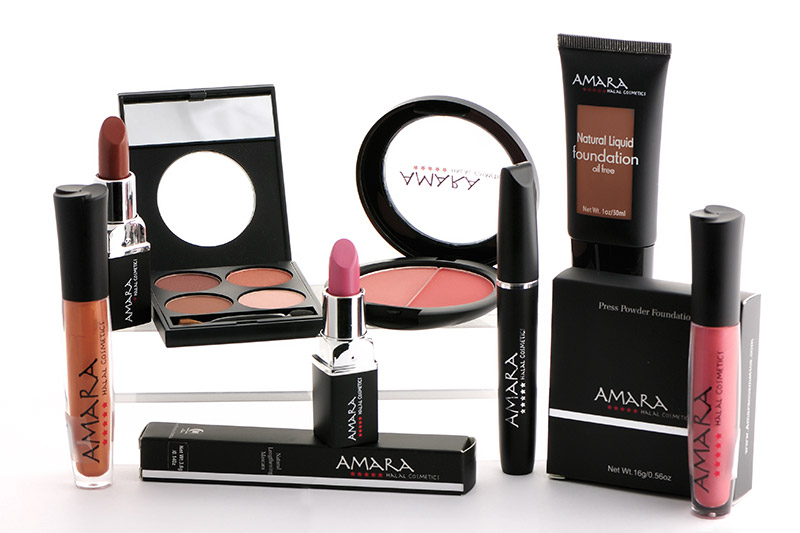
CASE STUDY-Amara Cosmetics develops made-in-USA halal brand
| AMARA COSMETICS | |
| CEO | Shamalia Mohamed |
| Year founded | 2011 |
| Headquarters | Los Angeles, California, USA |
Amara positions itself as the first U.S. halal-certified makeup brand, helping Muslim women with cosmetics and beauty. Amara helps with halal awareness and also positions itself secondarily as a vegan makeup line.
MISSION STATEMENT
Amara’s mission is to provide cosmetics that contain all-natural ingredients that are permissible under Islamic principles. Halal-certified, the company strives to raise awareness that ‘Halal isn’t limited to what is consumed as food but also applies to what is put on our skin’. All products are alcohol- and animal-free.
KEY ACHIEVEMENTS
The company produces 100 percent halal products in the U.S. It’s the first cosmetics line to be certified halal by the Islamic Food and Nutrition Council of America (IFANCA).
COMPANY OVERVIEW
Founded in 2011 by Shamalia Mohamed, Amara is the largest halal cosmetics brand in the U.S. Not only is the company based in the U.S., the products are entirely made in the U.S. as well, a major selling point for the line. Currently, the makeup is sold online at amaracosmetics.com.
Mohamed, who has a fashion background and an MBA, began the brand after realising there was not one halal makeup brand serving the nearly 1.7 million Muslim women in the U.S. With a population that was only going to grow (by 35 percent in the next 20 years), Mohamed saw untapped potential and developed her line.
Amara Cosmetics caters not just to those customers who keep halal. The products are 100 percent vegan, plant-based, paraben-free, and non-comedogenic. They’re also cruelty-free (not tested on animals).
HALAL MARKET STRATEGY
Mohamed worked closely with a chemist to ensure that each and every product earned IFANCA’s certification.
CHALLENGES FACED
- Achieving retail counter space alongside big beauty names. Currently, Amara Cosmetics is available online only.
- To come out of its niche market and offer itself to a wider market.
- Attracting a national and international audience through better marketing. The company is small and, as such, won’t reveal its numbers.
- Major beauty brands are mulling going cruelty-free and developing vegan lines, which would cut into the halal market share of smaller niche brands like Amara.
- Amara needs to develop a loyal cult following and quickly, or they will be swallowed up.
- The international halal cosmetics market is growing at a rate of 8 percent globally, according to research firm Future Market Insights. However, the most in-demand areas are those regions with large Muslim populations, well outside of the Americas and Europe. In the Middle East, the growth rate is estimated to be around 12 percent.
- Currently, the halal cosmetics market is growing internationally, especially in Southeast Asia, South Asia, East Asia and Oceania. Southeast Asia is the fastest growing market currently. The market in the U.S. is relatively small.
- As more mainstream cosmetics companies look for new markets, they’ll tap into the halal market, eclipsing the smaller brands.
| KEY TAKEAWAYS |
| Mohamed saw a hole in the market and developed a line for an underserved audience. |
| The company needs to broaden market and retail strategies, becoming more widely available. |
| Of the $334 billion global cosmetics market, the halal cosmetics sector is estimated at $13 billion, or less than 4 percent of the total, according to data from the Personal Care Science of Australia. |
| The Muslim population of the U.S. is projected to double from 0.6 percent of the population in 2010 to 1.6 percent by 2050 according to the Pew Research Group. It’s the only minority religious group that is growing in the United States. This means there is untapped potential for marketing. |
© SalaamGateway.com 2015

Amina Akhtar